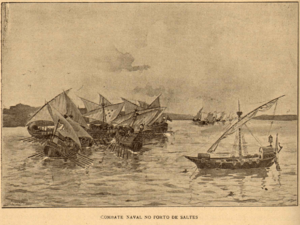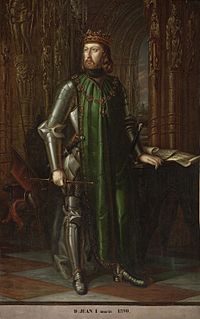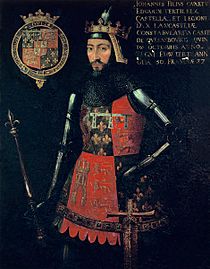Battle of Saltes Island facts for kids
Quick facts for kids Battle of Saltes Island |
|||||||
|---|---|---|---|---|---|---|---|
| Part of the Third Ferdinand War | |||||||
 Illustration by Alfredo Roque Gameiro |
|||||||
|
|||||||
| Belligerents | |||||||
| Commanders and leaders | |||||||
| João Afonso Telo | Fernando Sánchez de Tovar | ||||||
| Strength | |||||||
| 23 galleys | 17 galleys | ||||||
| Casualties and losses | |||||||
| 22 galleys and their crews captured | Minimum | ||||||
The Battle of Saltes Island was a big naval fight. It happened on July 17, 1381, near Saltes Island. This island is close to Huelva in what is now Spain. The battle was part of the Third Ferdinand War. It was fought between the navy of Castile and the navy of Portugal.
The Castilian fleet was led by Admiral Fernando Sánchez de Tovar. The Portuguese fleet was commanded by João Afonso Telo. Castile won the battle in a big way. This victory meant Castile became the strongest naval power in the Atlantic Ocean. Portugal's ability to fight at sea was almost completely destroyed.
Contents
Why Did the Battle of Saltes Island Happen?
The Ferdinand Wars Begin
After King Peter I of Castile died, Ferdinand I of Portugal wanted to rule Castile. This started a series of wars called the Ferdinand Wars. In 1381, King Ferdinand I of Portugal broke a peace treaty. This treaty, signed in 1373, had ended the second war. Breaking it started the Third Ferdinand War.
King Ferdinand I made an alliance with the young King Richard II of England. John of Gaunt, an English duke, also wanted to be King of Castile. He saw this alliance as a chance to push his claim. So, he sent about 2,000 English soldiers to Lisbon. These soldiers were led by the Earl of Cambridge. They were there to help Portugal invade Castilian lands.
Portugal wanted to stop the Castilian navy from attacking the English soldiers at sea. So, King Ferdinand I planned a naval blockade. In mid-July 1381, a Portuguese fleet left Lisbon. It was led by João Afonso Teles de Menezes. Their goal was to block the mouth of the Guadalquivir river. This would stop the Castilian fleet, which was docked in Seville.
At the same time, Admiral Fernando Sánchez de Tovar sailed his Castilian fleet from Seville. He was heading towards the Portuguese coast. On July 17, the two fleets saw each other. They were sailing in opposite directions near the Algarve region.
The Battle of Saltes Island
A Clever Trap is Set
Admiral Fernando Sánchez de Tovar of Castile looked at the situation. He thought his fleet might not win if they fought right away. So, he ordered his ships to turn around and go back to port. The Portuguese commander, João Afonso Telo, saw this as a chance to win. He ordered his fleet to chase the Castilians.
De Tovar told his men to row very fast. This forced the Portuguese ships to row just as hard to keep up. Because they were going so fast, the Portuguese ships started to spread out. Their battle formation broke apart.
The Trap is Sprung
After about two hours, the Portuguese rowers were very tired. They were also thirsty and hot from the summer sun. Many of their ships fell behind. Eight of their ships, which were at the front, attacked the small island of Saltés. They destroyed property belonging to fishermen there.
Admiral de Tovar saw that the Portuguese had fallen into his trap. He quickly turned his ships around. His fleet was still in a strong, tight formation. They attacked the scattered Portuguese ships. The Castilians easily captured the Portuguese galleys. The rest of the Portuguese fleet arrived one by one, in no order. They were also captured by the Castilians without much trouble. In the end, only one of the 23 Portuguese galleys managed to escape capture.
What Happened After the Battle?
Admiral Fernando Sánchez de Tovar returned to the port of Seville in victory. He brought with him 22 captured Portuguese galleys. The people of Seville were very happy. This victory also meant the English ships could safely dock in Lisbon.
Later, the English soldiers of Duke of Lancaster prepared their boats to fight de Tovar's fleet. But when they learned he had returned to Seville, the English ships went back to England. They left the English land forces in Lisbon.
Castile Controls the Sea
The big victory for Admiral Fernando Sánchez de Tovar was very important for the Third Ferdinand War. It destroyed Portugal's ability to attack by sea. Castile now had full control of the Atlantic Ocean. That year, Portugal could not build more fleets to fight Castile. Castile, on the other hand, did not need to build more ships. They already controlled the sea. So, the battle ended Portugal's naval campaign for 1381.
The effects of Portugal's defeat were also felt the next year. Portugal was much weaker militarily. Castile launched a strong attack by sea and land. The Castilians even reached the gates of Lisbon. This forced the King of Portugal to sign a peace treaty in August with John I of Castile. This treaty was called the Treaty of Elvas.
See also
 In Spanish: Batalla de la isla Saltés para niños
In Spanish: Batalla de la isla Saltés para niños
- List of Castilian monarchs
- List of Portuguese monarchs
- List of English monarchs
Images for kids
 | Dorothy Vaughan |
 | Charles Henry Turner |
 | Hildrus Poindexter |
 | Henry Cecil McBay |






